Entry-Level Data Scientist Resume Examples

Jul 18, 2024
|
12 min read
Crafting Your First Data Scientist Resume: A Detailed Guide to Crunching Skills and Landing Your Dream Job in Tech. Learn how to make your resume a compelling data story.
Rated by 348 people
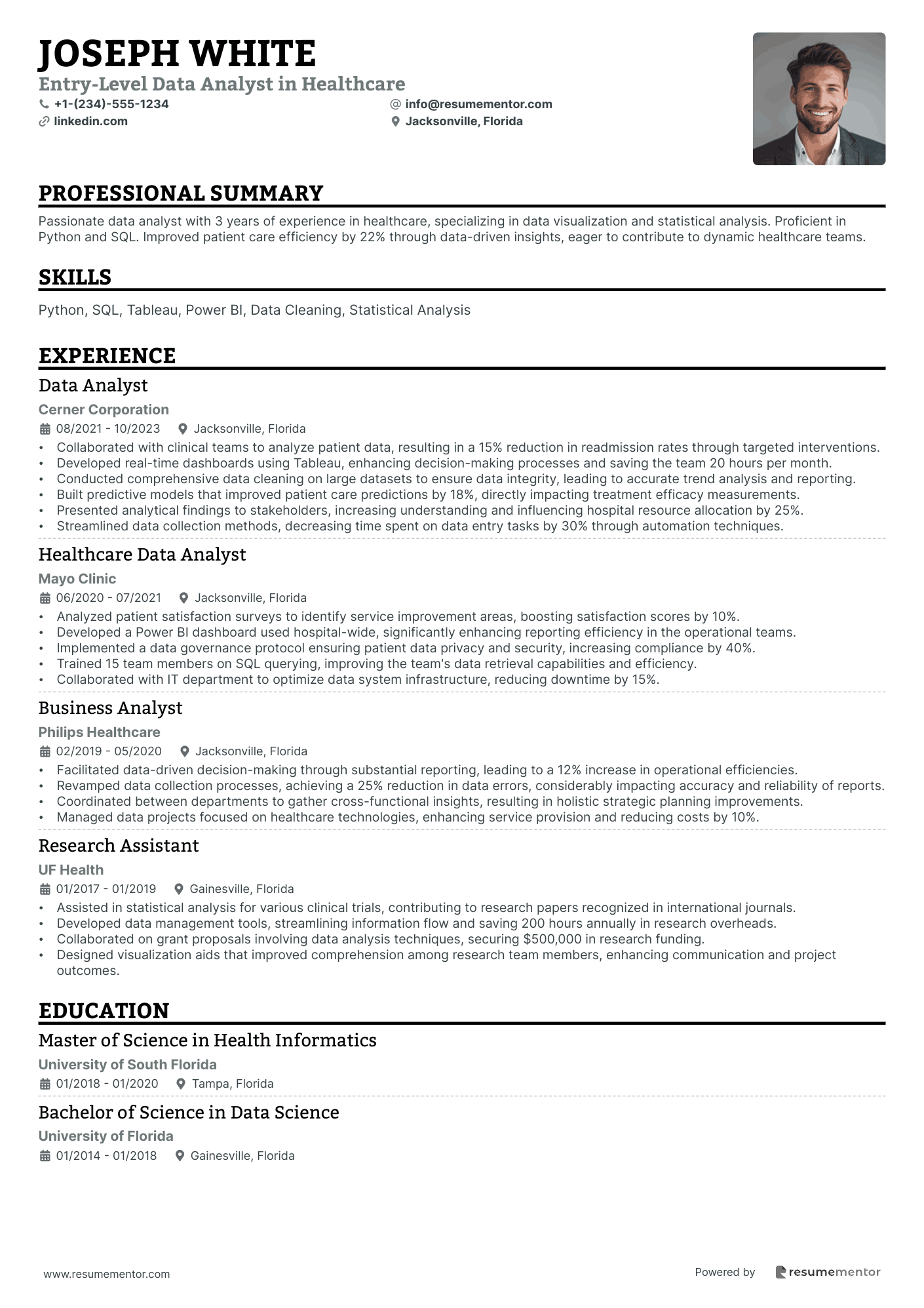
Entry-Level Data Analyst in Healthcare
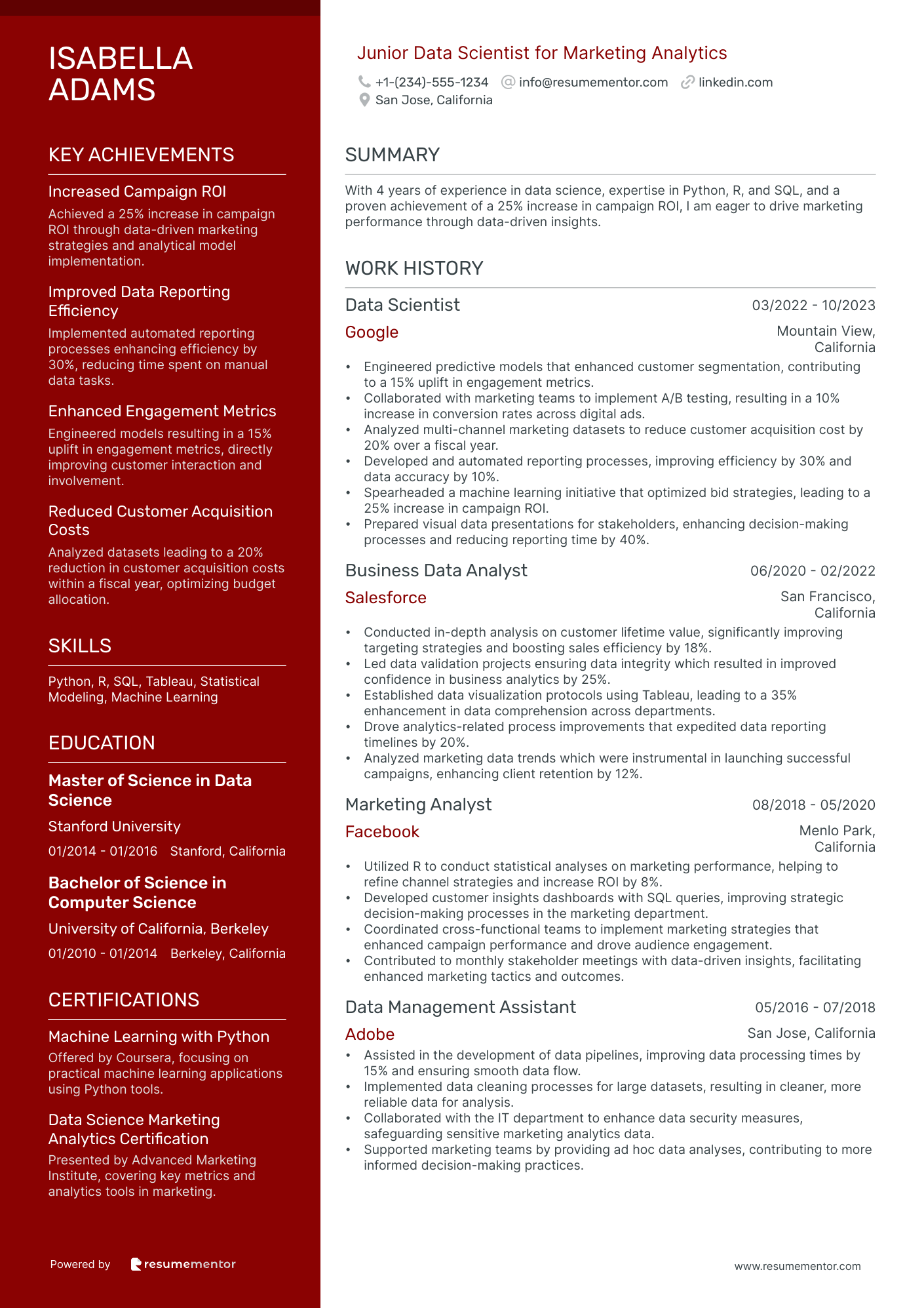
Junior Data Scientist for Marketing Analytics
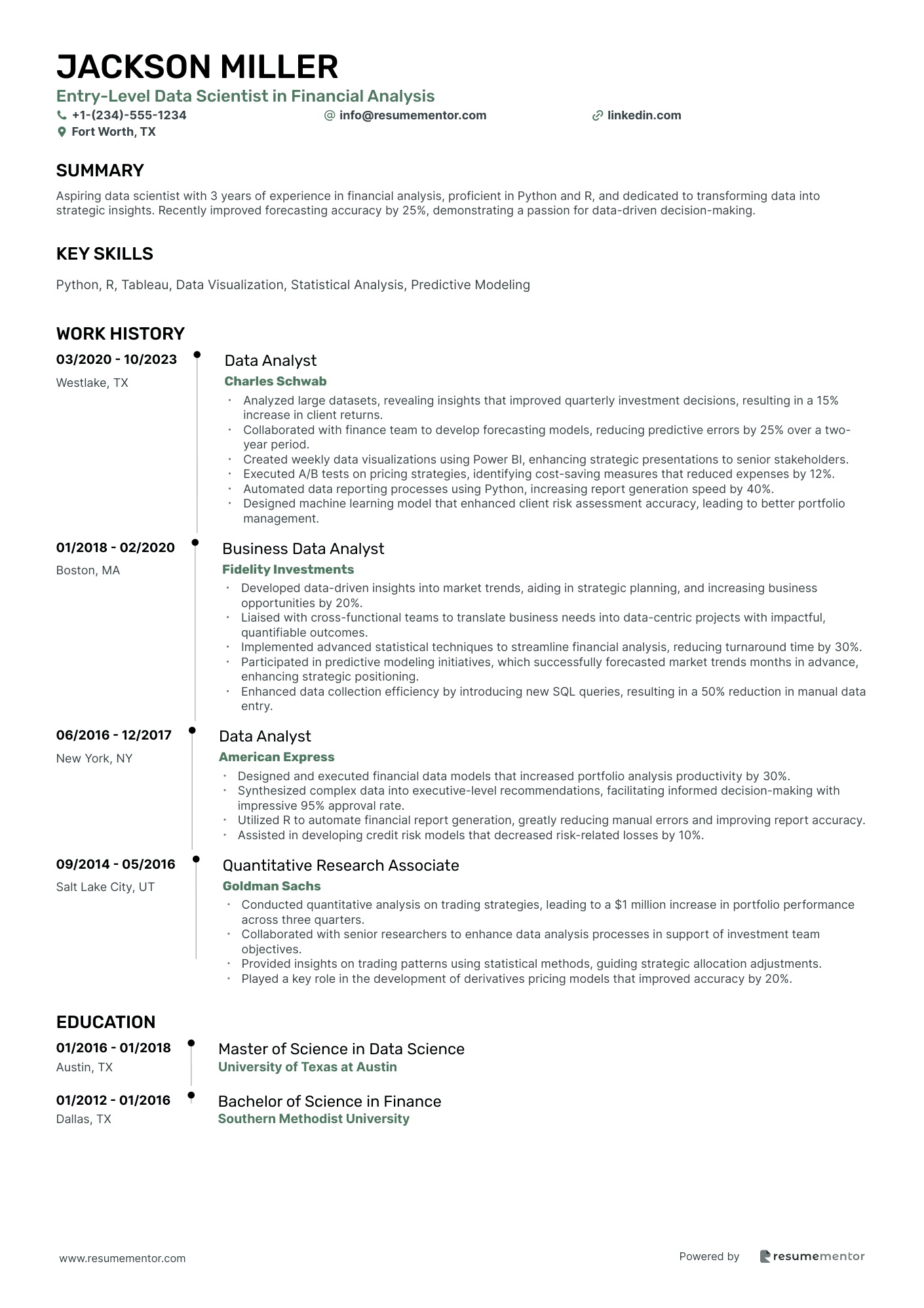
Entry-Level Data Scientist in Financial Analysis
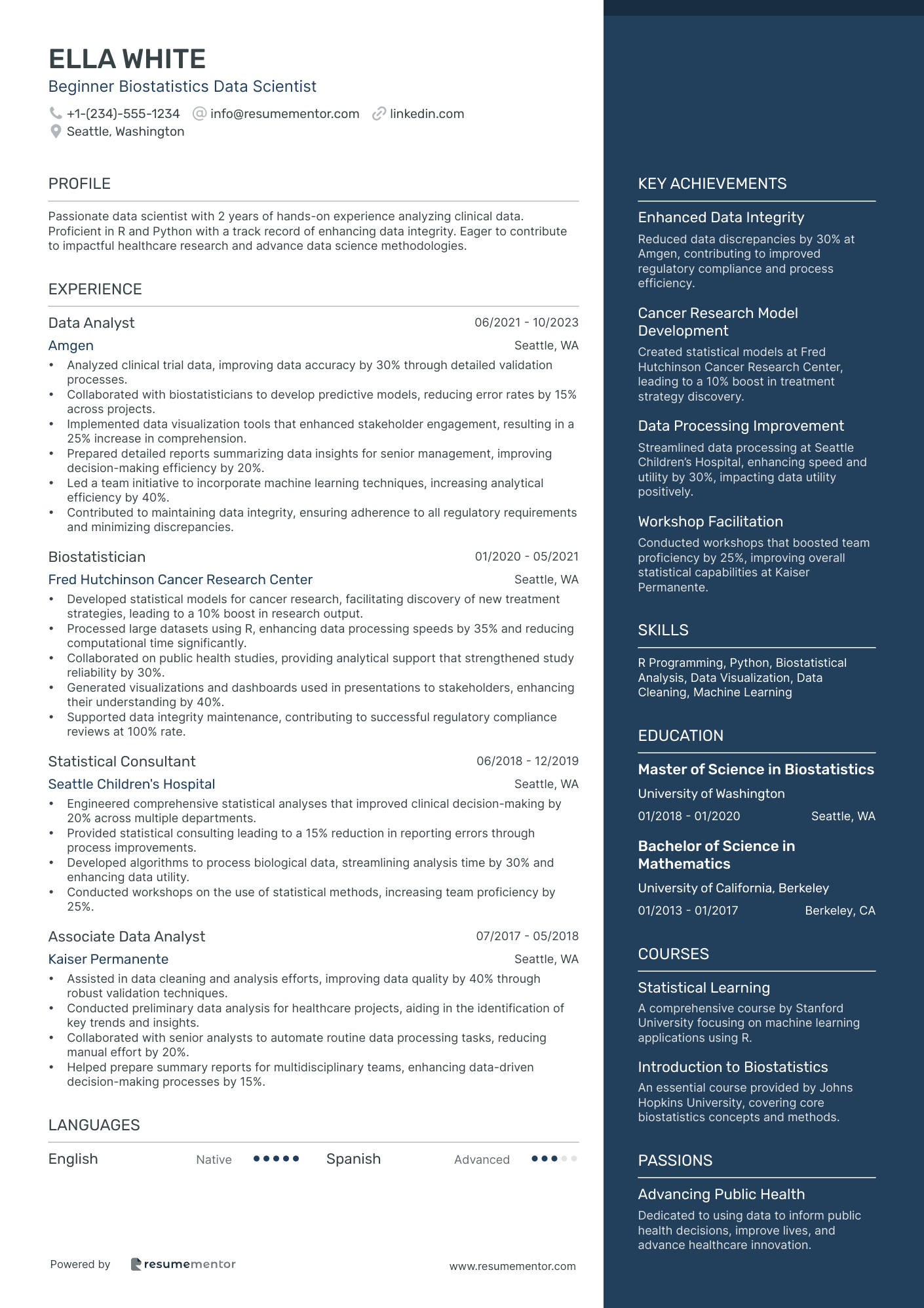
Beginner Biostatistics Data Scientist
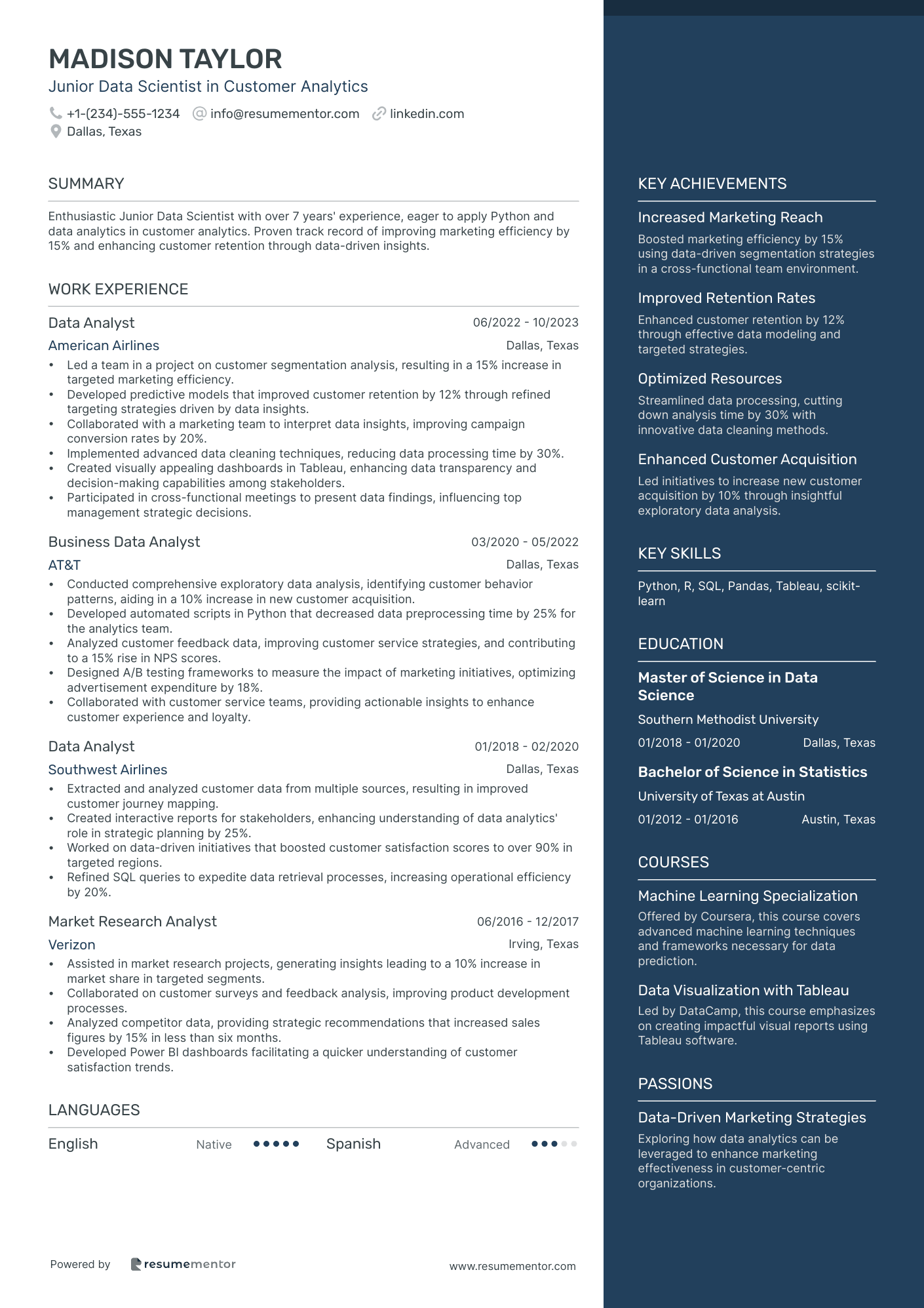
Junior Data Scientist in Customer Analytics
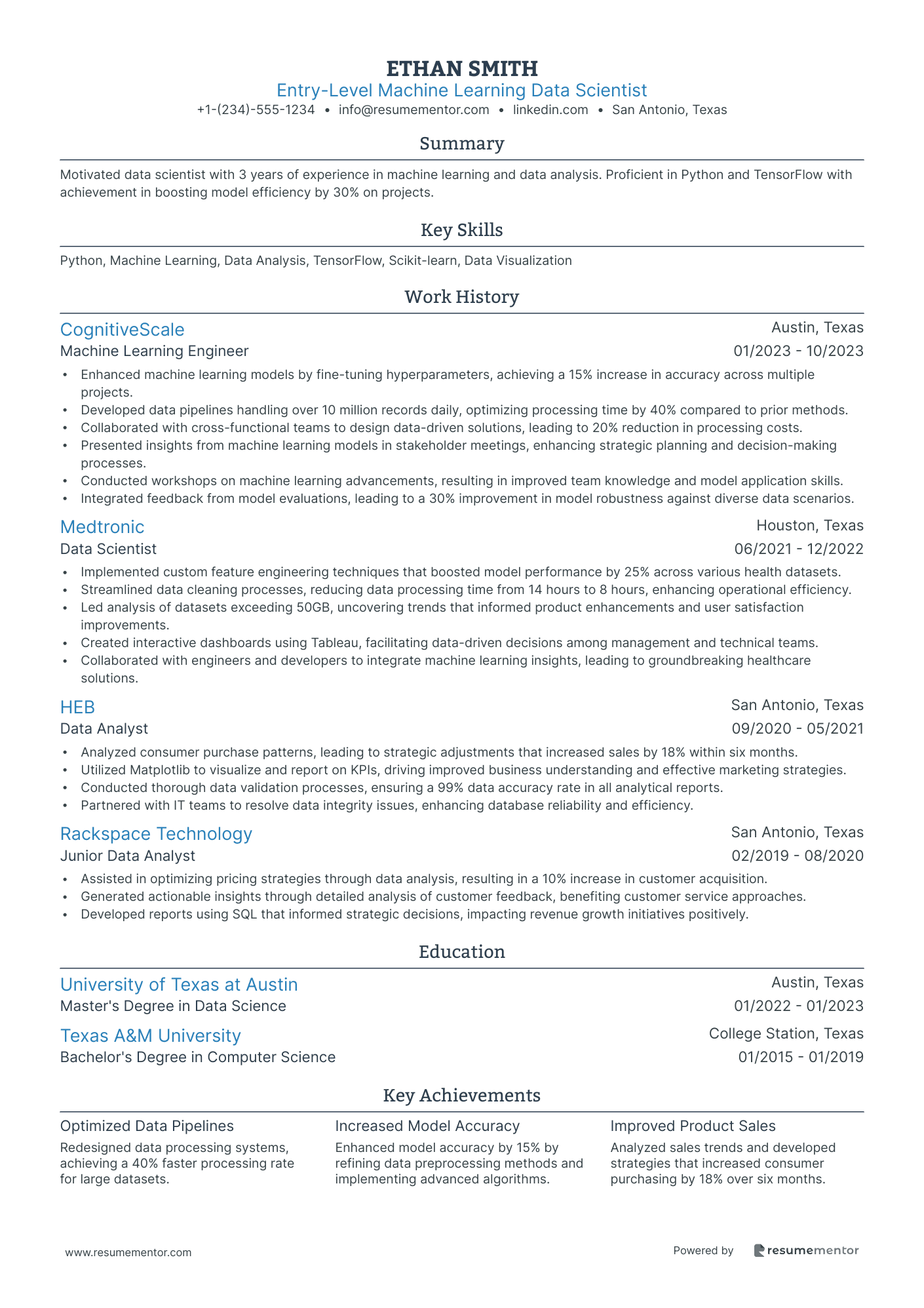
Entry-Level Machine Learning Data Scientist
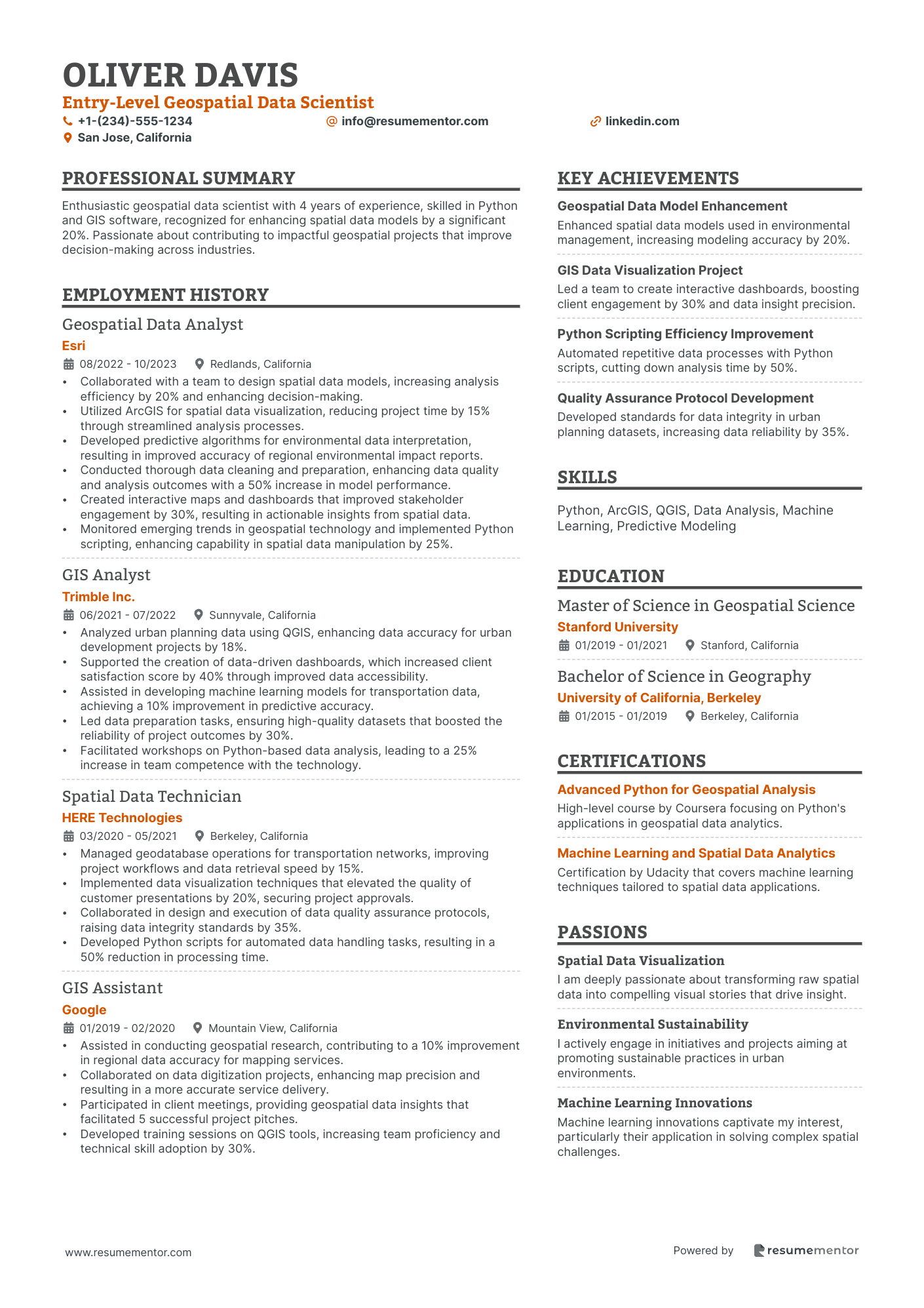
Entry-Level Geospatial Data Scientist
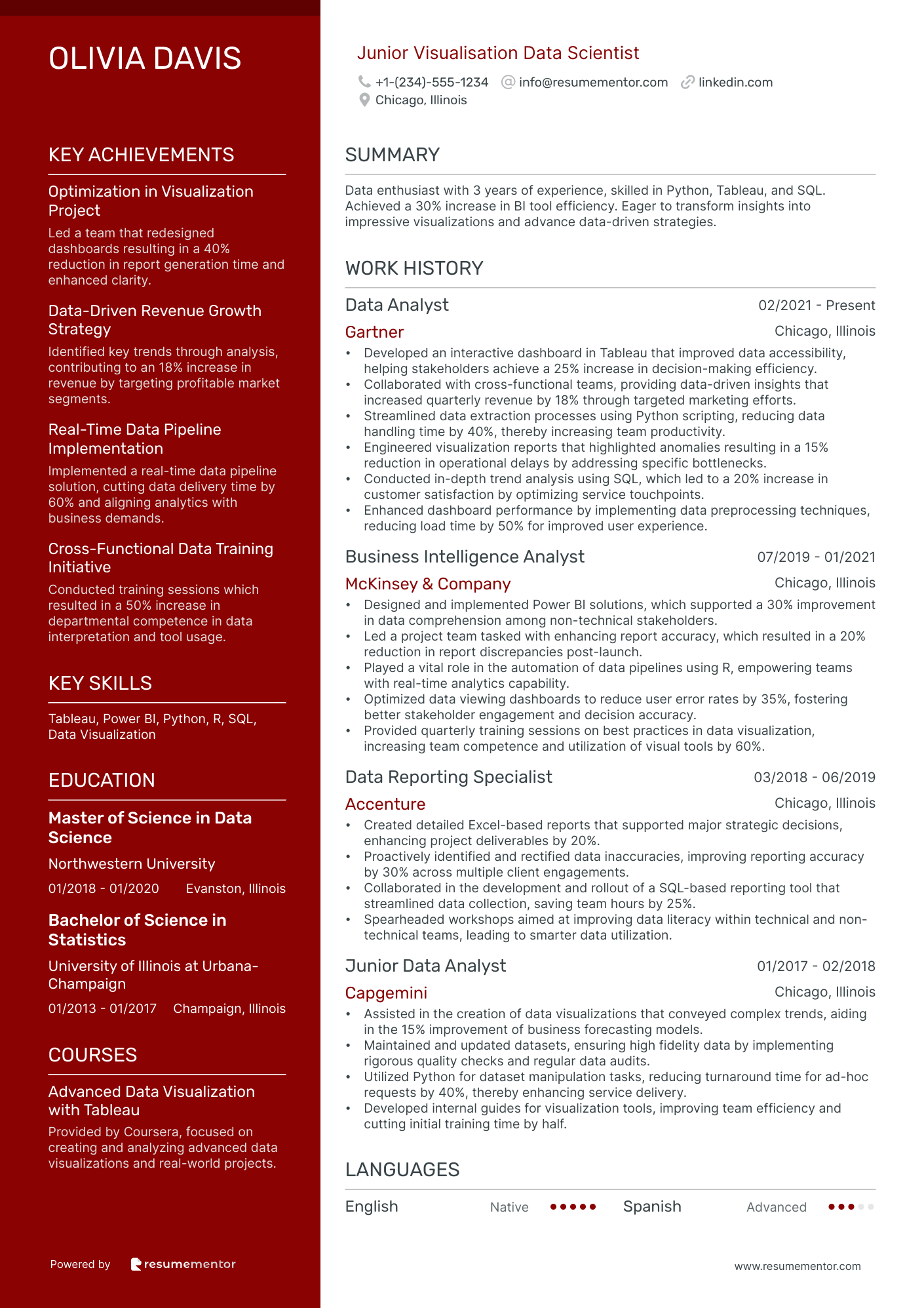
Junior Visualisation Data Scientist
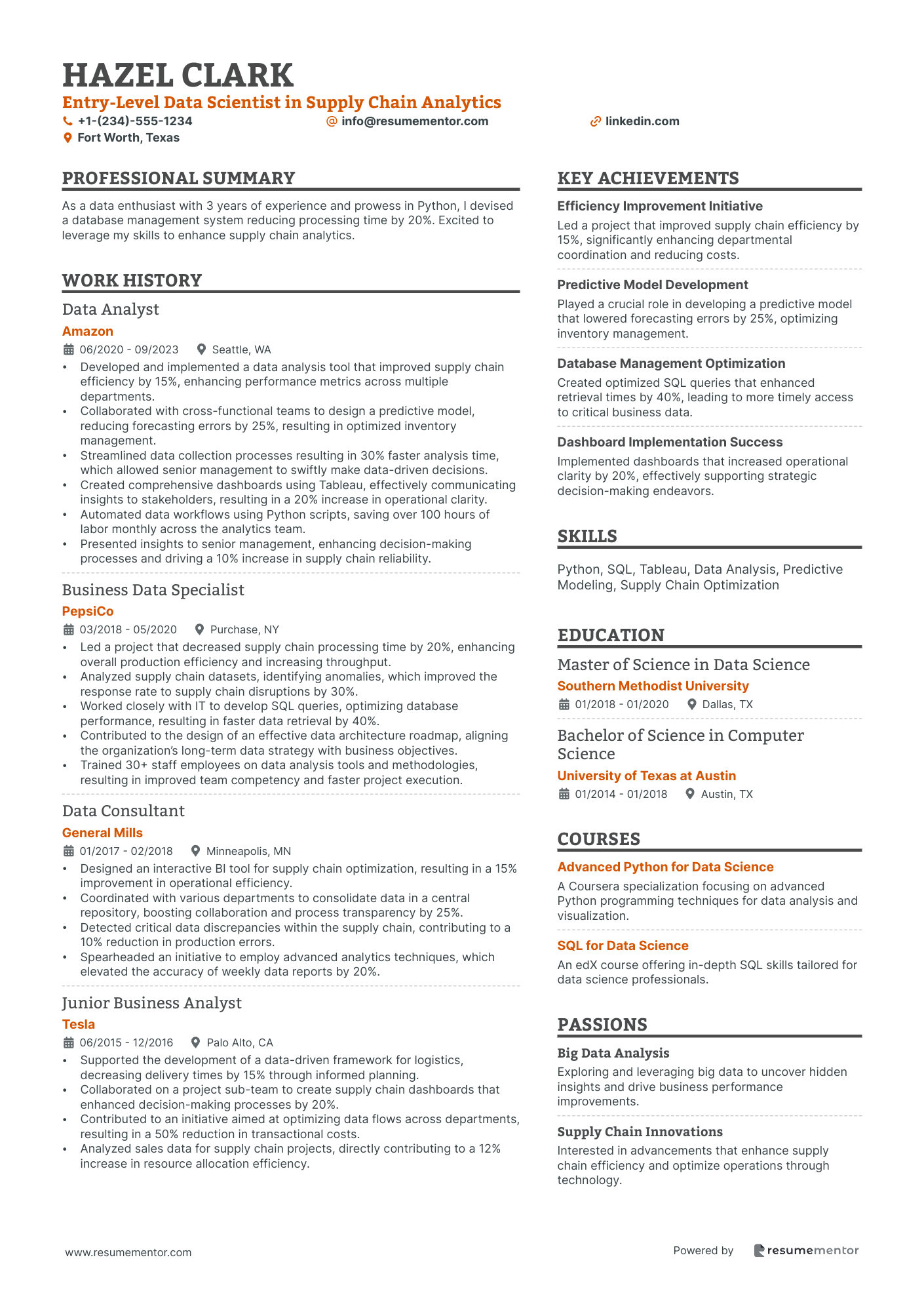
Entry-Level Data Scientist in Supply Chain Analytics
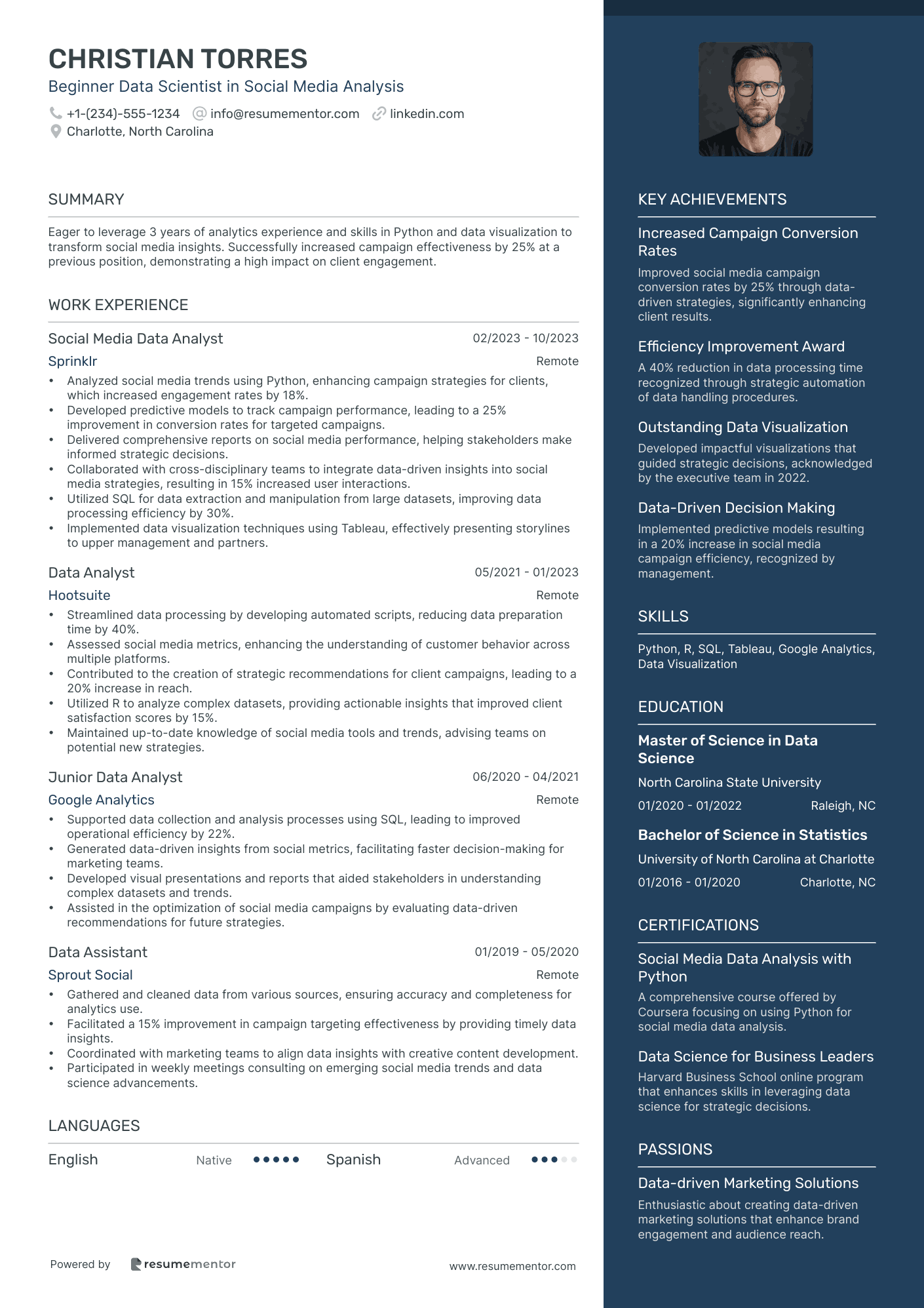
Beginner Data Scientist in Social Media Analysis

Entry-Level Data Analyst in Healthcare resume sample
- •Collaborated with clinical teams to analyze patient data, resulting in a 15% reduction in readmission rates through targeted interventions.
- •Developed real-time dashboards using Tableau, enhancing decision-making processes and saving the team 20 hours per month.
- •Conducted comprehensive data cleaning on large datasets to ensure data integrity, leading to accurate trend analysis and reporting.
- •Built predictive models that improved patient care predictions by 18%, directly impacting treatment efficacy measurements.
- •Presented analytical findings to stakeholders, increasing understanding and influencing hospital resource allocation by 25%.
- •Streamlined data collection methods, decreasing time spent on data entry tasks by 30% through automation techniques.
- •Analyzed patient satisfaction surveys to identify service improvement areas, boosting satisfaction scores by 10%.
- •Developed a Power BI dashboard used hospital-wide, significantly enhancing reporting efficiency in the operational teams.
- •Implemented a data governance protocol ensuring patient data privacy and security, increasing compliance by 40%.
- •Trained 15 team members on SQL querying, improving the team's data retrieval capabilities and efficiency.
- •Collaborated with IT department to optimize data system infrastructure, reducing downtime by 15%.
- •Facilitated data-driven decision-making through substantial reporting, leading to a 12% increase in operational efficiencies.
- •Revamped data collection processes, achieving a 25% reduction in data errors, considerably impacting accuracy and reliability of reports.
- •Coordinated between departments to gather cross-functional insights, resulting in holistic strategic planning improvements.
- •Managed data projects focused on healthcare technologies, enhancing service provision and reducing costs by 10%.
- •Assisted in statistical analysis for various clinical trials, contributing to research papers recognized in international journals.
- •Developed data management tools, streamlining information flow and saving 200 hours annually in research overheads.
- •Collaborated on grant proposals involving data analysis techniques, securing $500,000 in research funding.
- •Designed visualization aids that improved comprehension among research team members, enhancing communication and project outcomes.
Junior Data Scientist for Marketing Analytics resume sample
- •Engineered predictive models that enhanced customer segmentation, contributing to a 15% uplift in engagement metrics.
- •Collaborated with marketing teams to implement A/B testing, resulting in a 10% increase in conversion rates across digital ads.
- •Analyzed multi-channel marketing datasets to reduce customer acquisition cost by 20% over a fiscal year.
- •Developed and automated reporting processes, improving efficiency by 30% and data accuracy by 10%.
- •Spearheaded a machine learning initiative that optimized bid strategies, leading to a 25% increase in campaign ROI.
- •Prepared visual data presentations for stakeholders, enhancing decision-making processes and reducing reporting time by 40%.
- •Conducted in-depth analysis on customer lifetime value, significantly improving targeting strategies and boosting sales efficiency by 18%.
- •Led data validation projects ensuring data integrity which resulted in improved confidence in business analytics by 25%.
- •Established data visualization protocols using Tableau, leading to a 35% enhancement in data comprehension across departments.
- •Drove analytics-related process improvements that expedited data reporting timelines by 20%.
- •Analyzed marketing data trends which were instrumental in launching successful campaigns, enhancing client retention by 12%.
- •Utilized R to conduct statistical analyses on marketing performance, helping to refine channel strategies and increase ROI by 8%.
- •Developed customer insights dashboards with SQL queries, improving strategic decision-making processes in the marketing department.
- •Coordinated cross-functional teams to implement marketing strategies that enhanced campaign performance and drove audience engagement.
- •Contributed to monthly stakeholder meetings with data-driven insights, facilitating enhanced marketing tactics and outcomes.
- •Assisted in the development of data pipelines, improving data processing times by 15% and ensuring smooth data flow.
- •Implemented data cleaning processes for large datasets, resulting in cleaner, more reliable data for analysis.
- •Collaborated with the IT department to enhance data security measures, safeguarding sensitive marketing analytics data.
- •Supported marketing teams by providing ad hoc data analyses, contributing to more informed decision-making practices.
Entry-Level Data Scientist in Financial Analysis resume sample
- •Analyzed large datasets, revealing insights that improved quarterly investment decisions, resulting in a 15% increase in client returns.
- •Collaborated with finance team to develop forecasting models, reducing predictive errors by 25% over a two-year period.
- •Created weekly data visualizations using Power BI, enhancing strategic presentations to senior stakeholders.
- •Executed A/B tests on pricing strategies, identifying cost-saving measures that reduced expenses by 12%.
- •Automated data reporting processes using Python, increasing report generation speed by 40%.
- •Designed machine learning model that enhanced client risk assessment accuracy, leading to better portfolio management.
- •Developed data-driven insights into market trends, aiding in strategic planning, and increasing business opportunities by 20%.
- •Liaised with cross-functional teams to translate business needs into data-centric projects with impactful, quantifiable outcomes.
- •Implemented advanced statistical techniques to streamline financial analysis, reducing turnaround time by 30%.
- •Participated in predictive modeling initiatives, which successfully forecasted market trends months in advance, enhancing strategic positioning.
- •Enhanced data collection efficiency by introducing new SQL queries, resulting in a 50% reduction in manual data entry.
- •Designed and executed financial data models that increased portfolio analysis productivity by 30%.
- •Synthesized complex data into executive-level recommendations, facilitating informed decision-making with impressive 95% approval rate.
- •Utilized R to automate financial report generation, greatly reducing manual errors and improving report accuracy.
- •Assisted in developing credit risk models that decreased risk-related losses by 10%.
- •Conducted quantitative analysis on trading strategies, leading to a $1 million increase in portfolio performance across three quarters.
- •Collaborated with senior researchers to enhance data analysis processes in support of investment team objectives.
- •Provided insights on trading patterns using statistical methods, guiding strategic allocation adjustments.
- •Played a key role in the development of derivatives pricing models that improved accuracy by 20%.
Beginner Biostatistics Data Scientist resume sample
- •Analyzed clinical trial data, improving data accuracy by 30% through detailed validation processes.
- •Collaborated with biostatisticians to develop predictive models, reducing error rates by 15% across projects.
- •Implemented data visualization tools that enhanced stakeholder engagement, resulting in a 25% increase in comprehension.
- •Prepared detailed reports summarizing data insights for senior management, improving decision-making efficiency by 20%.
- •Led a team initiative to incorporate machine learning techniques, increasing analytical efficiency by 40%.
- •Contributed to maintaining data integrity, ensuring adherence to all regulatory requirements and minimizing discrepancies.
- •Developed statistical models for cancer research, facilitating discovery of new treatment strategies, leading to a 10% boost in research output.
- •Processed large datasets using R, enhancing data processing speeds by 35% and reducing computational time significantly.
- •Collaborated on public health studies, providing analytical support that strengthened study reliability by 30%.
- •Generated visualizations and dashboards used in presentations to stakeholders, enhancing their understanding by 40%.
- •Supported data integrity maintenance, contributing to successful regulatory compliance reviews at 100% rate.
- •Engineered comprehensive statistical analyses that improved clinical decision-making by 20% across multiple departments.
- •Provided statistical consulting leading to a 15% reduction in reporting errors through process improvements.
- •Developed algorithms to process biological data, streamlining analysis time by 30% and enhancing data utility.
- •Conducted workshops on the use of statistical methods, increasing team proficiency by 25%.
- •Assisted in data cleaning and analysis efforts, improving data quality by 40% through robust validation techniques.
- •Conducted preliminary data analysis for healthcare projects, aiding in the identification of key trends and insights.
- •Collaborated with senior analysts to automate routine data processing tasks, reducing manual effort by 20%.
- •Helped prepare summary reports for multidisciplinary teams, enhancing data-driven decision-making processes by 15%.
Junior Data Scientist in Customer Analytics resume sample
- •Led a team in a project on customer segmentation analysis, resulting in a 15% increase in targeted marketing efficiency.
- •Developed predictive models that improved customer retention by 12% through refined targeting strategies driven by data insights.
- •Collaborated with a marketing team to interpret data insights, improving campaign conversion rates by 20%.
- •Implemented advanced data cleaning techniques, reducing data processing time by 30%.
- •Created visually appealing dashboards in Tableau, enhancing data transparency and decision-making capabilities among stakeholders.
- •Participated in cross-functional meetings to present data findings, influencing top management strategic decisions.
- •Conducted comprehensive exploratory data analysis, identifying customer behavior patterns, aiding in a 10% increase in new customer acquisition.
- •Developed automated scripts in Python that decreased data preprocessing time by 25% for the analytics team.
- •Analyzed customer feedback data, improving customer service strategies, and contributing to a 15% rise in NPS scores.
- •Designed A/B testing frameworks to measure the impact of marketing initiatives, optimizing advertisement expenditure by 18%.
- •Collaborated with customer service teams, providing actionable insights to enhance customer experience and loyalty.
- •Extracted and analyzed customer data from multiple sources, resulting in improved customer journey mapping.
- •Created interactive reports for stakeholders, enhancing understanding of data analytics' role in strategic planning by 25%.
- •Worked on data-driven initiatives that boosted customer satisfaction scores to over 90% in targeted regions.
- •Refined SQL queries to expedite data retrieval processes, increasing operational efficiency by 20%.
- •Assisted in market research projects, generating insights leading to a 10% increase in market share in targeted segments.
- •Collaborated on customer surveys and feedback analysis, improving product development processes.
- •Analyzed competitor data, providing strategic recommendations that increased sales figures by 15% in less than six months.
- •Developed Power BI dashboards facilitating a quicker understanding of customer satisfaction trends.
Entry-Level Machine Learning Data Scientist resume sample
- •Enhanced machine learning models by fine-tuning hyperparameters, achieving a 15% increase in accuracy across multiple projects.
- •Developed data pipelines handling over 10 million records daily, optimizing processing time by 40% compared to prior methods.
- •Collaborated with cross-functional teams to design data-driven solutions, leading to 20% reduction in processing costs.
- •Presented insights from machine learning models in stakeholder meetings, enhancing strategic planning and decision-making processes.
- •Conducted workshops on machine learning advancements, resulting in improved team knowledge and model application skills.
- •Integrated feedback from model evaluations, leading to a 30% improvement in model robustness against diverse data scenarios.
- •Implemented custom feature engineering techniques that boosted model performance by 25% across various health datasets.
- •Streamlined data cleaning processes, reducing data processing time from 14 hours to 8 hours, enhancing operational efficiency.
- •Led analysis of datasets exceeding 50GB, uncovering trends that informed product enhancements and user satisfaction improvements.
- •Created interactive dashboards using Tableau, facilitating data-driven decisions among management and technical teams.
- •Collaborated with engineers and developers to integrate machine learning insights, leading to groundbreaking healthcare solutions.
- •Analyzed consumer purchase patterns, leading to strategic adjustments that increased sales by 18% within six months.
- •Utilized Matplotlib to visualize and report on KPIs, driving improved business understanding and effective marketing strategies.
- •Conducted thorough data validation processes, ensuring a 99% data accuracy rate in all analytical reports.
- •Partnered with IT teams to resolve data integrity issues, enhancing database reliability and efficiency.
- •Assisted in optimizing pricing strategies through data analysis, resulting in a 10% increase in customer acquisition.
- •Generated actionable insights through detailed analysis of customer feedback, benefiting customer service approaches.
- •Developed reports using SQL that informed strategic decisions, impacting revenue growth initiatives positively.
Entry-Level Geospatial Data Scientist resume sample
- •Collaborated with a team to design spatial data models, increasing analysis efficiency by 20% and enhancing decision-making.
- •Utilized ArcGIS for spatial data visualization, reducing project time by 15% through streamlined analysis processes.
- •Developed predictive algorithms for environmental data interpretation, resulting in improved accuracy of regional environmental impact reports.
- •Conducted thorough data cleaning and preparation, enhancing data quality and analysis outcomes with a 50% increase in model performance.
- •Created interactive maps and dashboards that improved stakeholder engagement by 30%, resulting in actionable insights from spatial data.
- •Monitored emerging trends in geospatial technology and implemented Python scripting, enhancing capability in spatial data manipulation by 25%.
- •Analyzed urban planning data using QGIS, enhancing data accuracy for urban development projects by 18%.
- •Supported the creation of data-driven dashboards, which increased client satisfaction score by 40% through improved data accessibility.
- •Assisted in developing machine learning models for transportation data, achieving a 10% improvement in predictive accuracy.
- •Led data preparation tasks, ensuring high-quality datasets that boosted the reliability of project outcomes by 30%.
- •Facilitated workshops on Python-based data analysis, leading to a 25% increase in team competence with the technology.
- •Managed geodatabase operations for transportation networks, improving project workflows and data retrieval speed by 15%.
- •Implemented data visualization techniques that elevated the quality of customer presentations by 20%, securing project approvals.
- •Collaborated in design and execution of data quality assurance protocols, raising data integrity standards by 35%.
- •Developed Python scripts for automated data handling tasks, resulting in a 50% reduction in processing time.
- •Assisted in conducting geospatial research, contributing to a 10% improvement in regional data accuracy for mapping services.
- •Collaborated on data digitization projects, enhancing map precision and resulting in a more accurate service delivery.
- •Participated in client meetings, providing geospatial data insights that facilitated 5 successful project pitches.
- •Developed training sessions on QGIS tools, increasing team proficiency and technical skill adoption by 30%.
Junior Visualisation Data Scientist resume sample
- •Developed an interactive dashboard in Tableau that improved data accessibility, helping stakeholders achieve a 25% increase in decision-making efficiency.
- •Collaborated with cross-functional teams, providing data-driven insights that increased quarterly revenue by 18% through targeted marketing efforts.
- •Streamlined data extraction processes using Python scripting, reducing data handling time by 40%, thereby increasing team productivity.
- •Engineered visualization reports that highlighted anomalies resulting in a 15% reduction in operational delays by addressing specific bottlenecks.
- •Conducted in-depth trend analysis using SQL, which led to a 20% increase in customer satisfaction by optimizing service touchpoints.
- •Enhanced dashboard performance by implementing data preprocessing techniques, reducing load time by 50% for improved user experience.
- •Designed and implemented Power BI solutions, which supported a 30% improvement in data comprehension among non-technical stakeholders.
- •Led a project team tasked with enhancing report accuracy, which resulted in a 20% reduction in report discrepancies post-launch.
- •Played a vital role in the automation of data pipelines using R, empowering teams with real-time analytics capability.
- •Optimized data viewing dashboards to reduce user error rates by 35%, fostering better stakeholder engagement and decision accuracy.
- •Provided quarterly training sessions on best practices in data visualization, increasing team competence and utilization of visual tools by 60%.
- •Created detailed Excel-based reports that supported major strategic decisions, enhancing project deliverables by 20%.
- •Proactively identified and rectified data inaccuracies, improving reporting accuracy by 30% across multiple client engagements.
- •Collaborated in the development and rollout of a SQL-based reporting tool that streamlined data collection, saving team hours by 25%.
- •Spearheaded workshops aimed at improving data literacy within technical and non-technical teams, leading to smarter data utilization.
- •Assisted in the creation of data visualizations that conveyed complex trends, aiding in the 15% improvement of business forecasting models.
- •Maintained and updated datasets, ensuring high fidelity data by implementing rigorous quality checks and regular data audits.
- •Utilized Python for dataset manipulation tasks, reducing turnaround time for ad-hoc requests by 40%, thereby enhancing service delivery.
- •Developed internal guides for visualization tools, improving team efficiency and cutting initial training time by half.
Entry-Level Data Scientist in Supply Chain Analytics resume sample
- •Developed and implemented a data analysis tool that improved supply chain efficiency by 15%, enhancing performance metrics across multiple departments.
- •Collaborated with cross-functional teams to design a predictive model, reducing forecasting errors by 25%, resulting in optimized inventory management.
- •Streamlined data collection processes resulting in 30% faster analysis time, which allowed senior management to swiftly make data-driven decisions.
- •Created comprehensive dashboards using Tableau, effectively communicating insights to stakeholders, resulting in a 20% increase in operational clarity.
- •Automated data workflows using Python scripts, saving over 100 hours of labor monthly across the analytics team.
- •Presented insights to senior management, enhancing decision-making processes and driving a 10% increase in supply chain reliability.
- •Led a project that decreased supply chain processing time by 20%, enhancing overall production efficiency and increasing throughput.
- •Analyzed supply chain datasets, identifying anomalies, which improved the response rate to supply chain disruptions by 30%.
- •Worked closely with IT to develop SQL queries, optimizing database performance, resulting in faster data retrieval by 40%.
- •Contributed to the design of an effective data architecture roadmap, aligning the organization’s long-term data strategy with business objectives.
- •Trained 30+ staff employees on data analysis tools and methodologies, resulting in improved team competency and faster project execution.
- •Designed an interactive BI tool for supply chain optimization, resulting in a 15% improvement in operational efficiency.
- •Coordinated with various departments to consolidate data in a central repository, boosting collaboration and process transparency by 25%.
- •Detected critical data discrepancies within the supply chain, contributing to a 10% reduction in production errors.
- •Spearheaded an initiative to employ advanced analytics techniques, which elevated the accuracy of weekly data reports by 20%.
- •Supported the development of a data-driven framework for logistics, decreasing delivery times by 15% through informed planning.
- •Collaborated on a project sub-team to create supply chain dashboards that enhanced decision-making processes by 20%.
- •Contributed to an initiative aimed at optimizing data flows across departments, resulting in a 50% reduction in transactional costs.
- •Analyzed sales data for supply chain projects, directly contributing to a 12% increase in resource allocation efficiency.
Beginner Data Scientist in Social Media Analysis resume sample
- •Analyzed social media trends using Python, enhancing campaign strategies for clients, which increased engagement rates by 18%.
- •Developed predictive models to track campaign performance, leading to a 25% improvement in conversion rates for targeted campaigns.
- •Delivered comprehensive reports on social media performance, helping stakeholders make informed strategic decisions.
- •Collaborated with cross-disciplinary teams to integrate data-driven insights into social media strategies, resulting in 15% increased user interactions.
- •Utilized SQL for data extraction and manipulation from large datasets, improving data processing efficiency by 30%.
- •Implemented data visualization techniques using Tableau, effectively presenting storylines to upper management and partners.
- •Streamlined data processing by developing automated scripts, reducing data preparation time by 40%.
- •Assessed social media metrics, enhancing the understanding of customer behavior across multiple platforms.
- •Contributed to the creation of strategic recommendations for client campaigns, leading to a 20% increase in reach.
- •Utilized R to analyze complex datasets, providing actionable insights that improved client satisfaction scores by 15%.
- •Maintained up-to-date knowledge of social media tools and trends, advising teams on potential new strategies.
- •Supported data collection and analysis processes using SQL, leading to improved operational efficiency by 22%.
- •Generated data-driven insights from social metrics, facilitating faster decision-making for marketing teams.
- •Developed visual presentations and reports that aided stakeholders in understanding complex datasets and trends.
- •Assisted in the optimization of social media campaigns by evaluating data-driven recommendations for future strategies.
- •Gathered and cleaned data from various sources, ensuring accuracy and completeness for analytics use.
- •Facilitated a 15% improvement in campaign targeting effectiveness by providing timely data insights.
- •Coordinated with marketing teams to align data insights with creative content development.
- •Participated in weekly meetings consulting on emerging social media trends and data science advancements.
As an entry-level data scientist, creating a standout resume is like solving your first big puzzle in job hunting. This document is where employers first get to gauge your analytical skills, technical expertise, and passion for data. Choosing which skills to highlight and how to describe your past projects can feel challenging, but remember, it's all about painting a vivid picture of your potential.
In a competitive field like data science, shining among applicants is crucial, even without years of experience. Starting with a structured resume template can help you effectively organize your strengths and present your capabilities. A well-designed resume template gives your resume a clear, professional look, leaving a lasting impression.
When your experience is just budding, clarity and structure are vital for seizing opportunities. By balancing your technical skills with soft skills and showcasing your eagerness to learn, you highlight your true value to employers. Drawing from your projects, coursework, and relevant internships where you've applied data-driven insights shows you are ready to dive into the field. With attention to detail and the right tools, your entry-level resume can be as data-driven and effective as you are.
Key Takeaways
- Organizing your resume using a structured template enhances clarity and shows professionalism, setting a strong first impression with potential employers.
- Highlight your technical skills like proficiency in Python, R, SQL, and data visualization tools, complemented by soft skills such as communication and teamwork.
- A strong experience section employs action-oriented language with quantifiable achievements that demonstrate problem-solving capabilities and readiness for real-world applications.
- Educational background should focus on relevant coursework and any honors or certifications, which highlight your commitment to learning and alignment with the job role.
- Incorporating additional sections like languages, hobbies, volunteer work, and books offers a comprehensive view of your multifaceted capabilities and dedication to the field.
What to focus on when writing your entry-level data scientist resume
An entry-level data scientist resume should effectively convey your analytical skills and problem-solving abilities, along with your enthusiasm for data-driven decision-making. It needs to demonstrate how your skills can enhance a data science team and showcase your growth potential in the field.
How to structure your entry-level data scientist resume
- Contact Information: Start with your full name, phone number, email address, and LinkedIn profile—this ensures recruiters have a clear and easy way to contact you and can quickly gain insight into your professional background when considering you for a position. Ensure that these details are accurate and up to date to avoid any missed opportunities.
- Objective Statement: Follow with a concise summary that expresses your passion for data science, detailing your career goals and relevant skills such as statistical analysis or machine learning—this allows recruiters to immediately understand your motivation and what you aim to bring to their team. Introduce your unique strengths and what sets you apart as a candidate, aligning them with the needs of the organization.
- Education: Reinforce your skills by listing your degree in a relevant field like Computer Science or Statistics, along with any certifications such as data science boot camps or online courses that further build your expertise—this section underscores your foundational knowledge and commitment to continuous learning, which is crucial in the rapidly evolving field of data science.
- Technical Skills: Complement your education by highlighting your proficiency in essential tools and programming languages like Python, R, and SQL, as well as your experience with visualization tools such as Tableau or Power BI—detailing these skills demonstrates your ability to effectively analyze and interpret data, a core requirement for any data scientist.
- Projects: Bring these skills to life by detailing school projects or personal data science initiatives. Describe the datasets, tools you used, and the outcomes or impacts—this showcases your ability to apply theoretical knowledge in practical settings and highlights your problem-solving capabilities and experience with real-world data.
- Experience: Wrap up with internships, part-time jobs, or relevant volunteer work. Emphasize how the skills you gained are relevant to data science—providing a well-rounded view of your capabilities through diverse experiences, making you a compelling candidate. Continuing below, we’ll explore each of these sections more in-depth and discuss resume format to optimize your presentation.
Which resume format to choose
Crafting an entry-level data scientist resume might seem daunting, but selecting the right format can simplify the process. A reverse chronological layout is ideal because it emphasizes your most recent education and projects tailored specifically to tech roles, making your qualifications immediately clear to potential employers. When it comes to fonts, Raleway, Montserrat, and Lato offer a modern, professional feel without overwhelming the reader. These fonts enhance clarity and keep your resume looking crisp, which is especially important when presenting technical information. Saving your resume as a PDF is crucial, as this format preserves your design, ensuring that hiring managers see your resume exactly as you intended, regardless of the device they use. Lastly, standard one-inch margins provide the necessary balance of space and content, making your resume easy to read and visually appealing. Each of these details contributes to presenting you as a polished and prepared candidate ready to step into the data science field.
How to write a quantifiable resume experience section
Crafting an entry-level data scientist resume experience section means emphasizing your skills and achievements relevant to the job you want. This part showcases how you apply data science skills effectively. Start by structuring your experience in reverse chronological order, capturing roles that highlight your analytical prowess, even if they were unconventional. To make your resume resonate, tailor each submission by weaving in keywords from the job description. Strong action verbs like "analyzed," "developed," and "optimized" bring your contributions to life.
Let’s see a JSON example for an entry-level data scientist:
- •Developed a predictive model that increased operational efficiency by 15%.
- •Analyzed customer data, identifying trends that enhanced marketing strategies by 20%.
- •Collaborated with cross-functional teams to clean and process datasets, improving data quality by 25%.
- •Created interactive dashboards that facilitated real-time data visualization and decision-making.
This experience section is effective because it seamlessly combines quantifiable achievements with a clear narrative of your data science skills. By highlighting measurable impacts such as increased efficiency and improved strategies, you give employers a vivid picture of your contributions. The structured format zeroes in on relevant roles, drawing attention to key achievements over the past years. By aligning your experience with the job description, you show a deep understanding of what the employer needs and which problems you can solve. Action-oriented language energizes the section, conveying a proactive, results-driven approach that is compelling to potential employers.
Technology-Focused resume experience section
A technology-focused entry-level data scientist resume experience section should highlight your ability to effectively manage data tasks. Begin by showcasing any relevant internships, projects, or academic achievements that align with the job you're targeting. Mention the specific tools and technologies like Python, SQL, or data visualization software that you have used, and connect these to the tasks and achievements you've accomplished. Demonstrating the impact of your work is essential, so include examples that show how you solved problems or contributed to team objectives.
The way you present your roles and achievements can greatly influence potential employers' perceptions of your abilities. Use simple, straightforward language to ensure clarity and avoid jargon that might confuse. Choose active verbs to describe your actions, and whenever possible, quantify your successes with numbers to make your experience more concrete and impactful. Here’s a structured example of how to present your experience:
Data Analyst Intern
Tech Innovations
June 2022 - August 2022
- Developed Python scripts to process large datasets, reducing processing time by 30%.
- Collaborated with a team to create informative data dashboards using Tableau.
- Analyzed sales data to identify trends, providing insights for a major retail campaign.
- Conducted statistical analysis to support data-driven decisions for marketing strategies.
Project-Focused resume experience section
A project-focused entry-level data scientist resume experience section should clearly illustrate how you engaged with real-world challenges to make an impact. Share your experiences in analyzing data and delivering insights that drive decision-making. Start with a precise project-focused title that encapsulates your accomplishments. In your descriptions, connect the skills you employed with the challenges you overcame and the outcomes you achieved, crafting a narrative that showcases your problem-solving prowess.
Highlight your role in the various stages of the data science process, ensuring each task flows naturally into the next. Use strong action verbs to describe activities like preparing datasets, constructing predictive models, and producing visualizations. Show how your efforts contributed to larger projects or goals, and use quantifiable results to back up your achievements. This approach highlights both your technical expertise and ability to collaborate effectively within a team, creating a cohesive picture of your capabilities.
Data Science Intern
TechBase Co.
June 2022 - August 2022
- Analyzed a dataset of 10,000+ entries using Python to forecast sales trends, improving projection accuracy by 15%.
- Collaborated with a team of 4 to implement machine learning algorithms, which enhanced customer segmentation efforts.
- Created data visualizations using Tableau, presenting insights to stakeholders and aiding in strategic planning.
- Cleaned and prepared large datasets, reducing processing time by 20% through optimized processing techniques.
Responsibility-Focused resume experience section
A responsibility-focused entry-level data scientist resume experience section should clearly highlight how you've made a tangible impact in your previous roles. Start by showcasing projects where you've applied your analytical skills and demonstrated your understanding of data. Incorporate tasks where you utilized popular tools or programming languages like Python, R, or SQL, ensuring to emphasize the positive outcomes or improvements your efforts achieved. By providing specific examples or numbers, you'll give context that helps your achievements stand out.
Even if your previous experience isn't directly related to data science, it's important to point out transferable skills such as teamwork, problem-solving, or communication. Each bullet point should be tailored to reflect the responsibilities you handled, such as data collection, cleaning, and visualization. This approach not only highlights your data handling abilities but also underscores your proactive attitude in past roles, making you a compelling candidate for potential employers.
Data Science Intern
Tech Innovations
June 2022 - August 2022
- Compiled and analyzed sales data to identify revenue trends, leading to a 10% boost in sales forecasting accuracy.
- Created interactive dashboards using Tableau for real-time data monitoring, boosting team efficiency by 15%.
- Cleaned and prepared large datasets, cutting errors by 25% with careful attention to detail.
- Joined weekly team meetings to discuss findings and suggest data-driven strategies for better customer engagement.
Growth-Focused resume experience section
A growth-focused entry-level data scientist resume experience section should clearly showcase your potential to make a meaningful impact. Highlight projects and responsibilities that reflect your skills in driving company growth and solving real-world problems. Even without direct experience in data science, you can include training or projects that demonstrate your data-driven mindset and analytical abilities.
Craft your bullet points with engaging language to outline your achievements and their impact. Use action verbs to start each point, reinforcing your proactive role. Incorporate measurable outcomes wherever possible to concretely illustrate your contributions. Tailor these experiences to align with the skills and qualities the potential employer is seeking, ensuring your experience section stands out.
Data Science Intern
Tech Innovations Inc.
June 2023 - August 2023
- Analyzed customer data to identify trends, boosting sales forecasting accuracy by 15%.
- Created a recommendation engine using Python, which led to a 20% increase in website engagement.
- Worked with a team of four to present data-driven insights to executives, leading to better strategic decisions.
- Applied machine learning algorithms to predict user behavior, improving targeting for marketing campaigns.
Write your entry-level data scientist resume summary section
A data science-focused resume summary should serve as a dynamic introduction, especially for entry-level professionals. This part of your resume provides a quick overview of your capabilities, making it essential for setting a strong first impression. For those entering the field, the summary should capture your technical skills, academic background, and relevant projects or internships. Positioned at the top, it establishes the framework for your entire resume. Unlike a resume objective, which states your career goals, a summary zeros in on your skills and achievements. Here’s an example of an effective resume summary for an entry-level data scientist:
This summary successfully connects your academic achievements with practical experience, illustrating a readiness to contribute effectively to a team. By highlighting your technical expertise and hands-on experiences, it paints a clear picture of your potential in the field. It’s this combination of skills and enthusiasm that can set you apart in a competitive job market. When you describe yourself, balance your technical capabilities with an evident passion for data-driven solutions. Use engaging, active language to convey your problem-solving abilities and drive. Your summary should resemble a powerful elevator pitch, compelling employers to delve deeper into your application.
Listing your entry-level data scientist skills on your resume
A skills-focused entry-level data scientist resume should seamlessly integrate key strengths into your experience and summary sections. Including personal qualities like communication and teamwork alongside hard skills can set your application apart. Hard skills are the technical abilities—such as programming languages and data analysis methods—that you gain through training. They form the foundation of your technical competency.
Your skills and strengths act like essential keywords. These words not only attract the attention of hiring managers but also help your resume pass through digital screening systems. Choosing the right terms enhances your chances of being noticed.
Example of a standalone skills section:
This example is effective because it uses specific, relevant terms that can be quickly identified by recruiters and software. Each skill listed relates directly to a technical aspect or tool in data science, demonstrating your readiness for entry-level roles.
Best hard skills to feature on your entry-level data scientist resume
Hard skills in this field should demonstrate your ability to manage and analyze data effectively. Communicating your technical proficiency is essential for entry-level data science tasks.
Hard Skills
- Python
- R
- SQL
- Machine Learning
- Data Analysis
- Data Visualization
- Statistics
- Predictive Modeling
- Big Data Tools
- Data Cleaning
- Natural Language Processing (NLP)
- Data Mining
- Excel
- Tableau
- Statistical Software Packages
Best soft skills to feature on your entry-level data scientist resume
Soft skills convey your ability to work well with others and tackle challenges. Highlighting these shows teammates and employers your readiness to collaborate and innovate effectively.
Soft Skills
- Communication
- Problem-Solving
- Teamwork
- Adaptability
- Critical Thinking
- Attention to Detail
- Time Management
- Creativity
- Emotional Intelligence
- Patience
- Organizational Skills
- Decision Making
- Initiative
- Curiosity
- Conflict Resolution
How to include your education on your resume
The education section is an important part of your entry-level data scientist resume. It provides insight into your academic background and qualifications. Tailoring this section to the job you're applying for can make a significant difference. Focus on relevant coursework or projects that align with the role. Irrelevant education should not be included to avoid clutter.
When listing your GPA, include it if it is above 3.0 and specify it as a fraction, like 3.5/4.0. Mention honors such as cum laude by including "cum laude" after your degree. List your degree in the format "Degree, Major" with the institution's name and graduation date.
Wrong example:
Right example:
The second example is effective because it highlights a relevant degree and specialization in data science. Listing the magna cum laude distinction conveys academic excellence. Including the GPA signals strong academic performance, while showcasing specific, relevant coursework demonstrates direct alignment with the data science field.
How to include entry-level data scientist certificates on your resume
Including a certificates section in your entry-level data scientist resume is essential. Certificates showcase your knowledge and commitment to potential employers. You could even include this section in the header to grab attention.
List the name of the certificate, include the date you received it, and add the issuing organization. For example, putting "IBM Data Science Professional Certificate | Coursera" in the header makes it clear you've received formal training. In the standalone section, list certificates that show you have relevant skills for the data science role.
For instance, you can follow this format:
This example is effective because it includes well-known institutions and relevant courses. These certificates demonstrate specific skills in data analytics and machine learning, which are critical for a data scientist role. The clear and concise format makes it easy for recruiters to see your qualifications.
Extra sections to include in your entry-level data scientist resume
Entering the world of data science can be rewarding and challenging, especially at the entry level. Your resume is your first impression with potential employers and it's important to make it stand out. Beyond the usual sections detailing your skills, education, and work experience, consider including some less conventional sections that can set you apart.
Language section — Highlight any languages you know, such as Python, SQL, or any human languages. This can show your versatility and ability to work in diverse settings.
Hobbies and interests section — Share activities you are passionate about that may align with industry trends, like participating in hackathons or data challenges. This provides a fuller picture of you as a multifaceted individual.
Volunteer work section — List any volunteer experience that involves data work or community projects. Demonstrating your willingness to use your skills for good causes can emphasize your dedication and character.
Books section — Mention influential books you have read about data science or related fields. This shows your commitment to continuous learning and staying updated with industry trends.
In Conclusion
In conclusion, crafting an entry-level data scientist resume may initially appear daunting, but with the right approach, you can create a compelling document that showcases your potential in this competitive field. Start by organizing your resume with a structured template that clearly highlights your analytical skills, technical expertise, and enthusiasm for data-driven decision-making. Focus on showcasing your education, projects, and any relevant internships to provide tangible evidence of your capabilities. It is crucial to quantify your achievements, as this can powerfully illustrate your ability to make real impacts using data.
When selecting your resume format, opt for a reverse chronological layout to immediately emphasize your most recent and relevant experiences. Pay attention to details such as using professional fonts and saving your resume as a PDF to maintain its design across various platforms. Remember to integrate both hard and soft skills throughout your resume, ensuring to include keywords that align with the job description you're targeting.
Furthermore, highlight any relevant certifications and courses, as these can demonstrate your commitment to growing your expertise in data science. Beyond the basics, consider adding extra sections like languages, hobbies, or volunteer work to enrich your profile. Each section of your resume should collectively construct a portrait of you as a knowledgeable and eager candidate, ready to contribute to data science teams and help drive informed decisions.
Ultimately, your resume should serve as both a testament to your achievements thus far and a preview of your potential to excel within the industry. By maintaining clarity, relevance, and a data-driven approach, you can make a memorable first impression on potential employers, showcasing your readiness to embark on a successful career in data science.
Related Articles

Continue Reading
Check more recommended readings to get the job of your dreams.
Resume
Resources
Tools
© 2026. All rights reserved.
Made with love by people who care.

